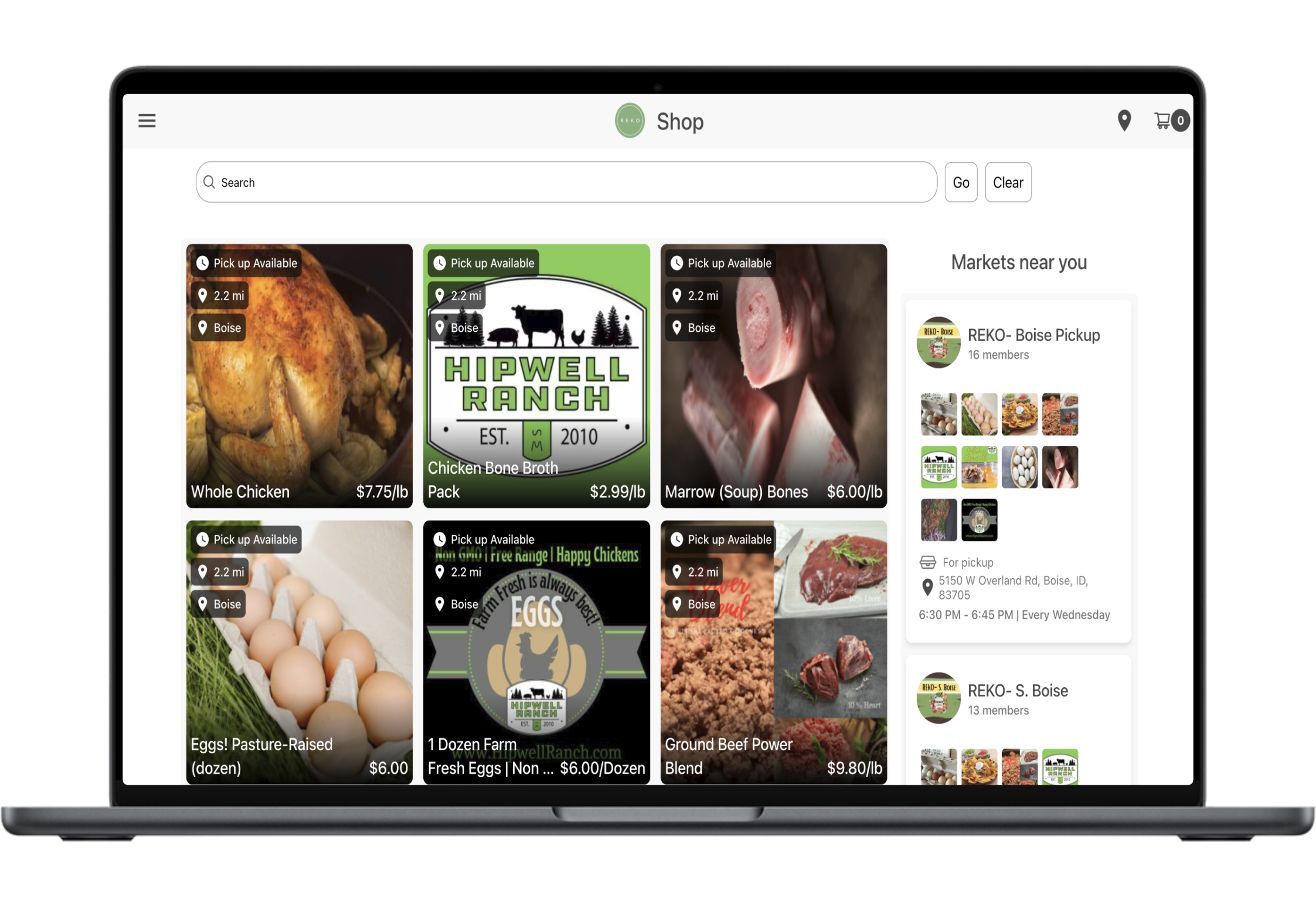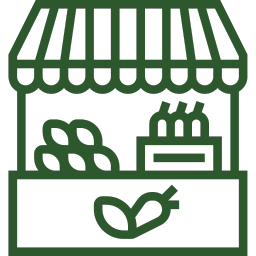Northwest Territories Agriculture Overview
The Northwest Territories, while known for its vast wilderness and rugged landscapes, is also home to innovative agricultural practices that allow for the cultivation of fresh produce even in its challenging climate. The territory's focus on sustainable and community-based agriculture supports local food security and provides fresh, locally grown food. Here are some highlights of what the Northwest Territories agriculture has to offer:
Major Crops in the Northwest Territories
The Northwest Territories' top crops include cold-hardy vegetables such as potatoes, carrots, and leafy greens. Greenhouse and indoor farming techniques are widely used to extend the growing season and enhance the variety of available produce. These locally grown crops contribute significantly to food security in the Northwest Territories.
Local Farmers' Markets in the Northwest Territories
While traditional farmers' markets are rare due to the remote and scattered communities, local initiatives often feature pop-up markets and community-supported agriculture (CSA) programs. These markets provide a direct connection between consumers and local growers, ensuring access to fresh, Northwest Territories-grown produce.
Northwest Territories Farm-to-Table Initiatives
The Northwest Territories has a growing farm-to-table movement, with many community programs and local eateries sourcing their ingredients from local growers. This initiative supports local agriculture and ensures that residents enjoy the freshest and most flavorful ingredients. Community kitchens and local food programs often highlight the importance of fresh, locally sourced food.
Agrotourism and U-Pick Farms in the Northwest Territories
Agrotourism is emerging as a way to engage locals and visitors with the Northwest Territories' unique agricultural practices. U-pick farms, though limited, provide an educational and hands-on experience with arctic farming. Community gardens and educational programs are also significant in promoting agricultural awareness.
Northwest Territories Livestock and Dairy
Livestock farming in the Northwest Territories focuses on small-scale, sustainable practices. Community initiatives often include raising poultry and small livestock to support local food needs. Fresh dairy products are less common, but some communities engage in small-scale dairy farming, producing fresh milk and cheese.
Organic and Sustainable Farming in the Northwest Territories
Sustainable and organic farming practices are crucial in the Northwest Territories due to the fragile arctic environment. Many farms adopt methods that minimize environmental impact and promote biodiversity. Look for community-supported programs and local farms that follow sustainable practices when shopping for fresh produce in the Northwest Territories.
Seasonal Produce in the Northwest Territories
The Northwest Territories' growing season, though short, allows for a variety of seasonal produce. In the summer, look for fresh herbs, lettuce, and radishes. Greenhouse produce extends the availability of vegetables like tomatoes, cucumbers, and peppers. Winter markets in the Northwest Territories often feature preserved and stored vegetables, ensuring food availability year-round.
Supporting local agriculture in the Northwest Territories not only provides you with fresh and delicious food but also strengthens the local economy and promotes sustainable farming practices. Explore the diverse offerings of the Northwest Territories' farms and enjoy the bounty of this agriculturally innovative territory.
Submit Your Farm
The purpose of this site is to help customers find and buy directly from local farms. We understand if farms wish to stay more private or anonymous, so for the address, you can simply share GPS coordinates that are "nearby" where you live, or you can also share a "drop" location address where customers can meet you to pick up food. All fields are optional, so you do not have to fill all of them out, only the ones you want to. For example, only put your phone or email if you want customers reaching out to you via those options.
If the form fill is not working for you, email tyler@rekohub.com with your farms information and he will add it to the maps.
Why More People Are Buying Local Now
Health
Environment
Economy
Community
There are lots of reasons to buy local.
Learn more about how locally produced food is better for your health, the environment, the economy, and our communities by clicking on an image above.
Health

Local food is better for our health because it doesn't have pesticides, herbicides, or hormones, and it is additive and preservative-free. Freshly harvested produce retains more nutrients compared to food that has traveled long distances and been stored for extended periods. By choosing local, you're also reducing your exposure to potentially harmful chemicals and supporting farming practices that prioritize sustainability and human health. Local farms often grow a diverse range of crops, which can lead to a more varied and balanced diet for consumers.
Local food systems also encourage seasonal eating, which means you consume produce when it's at its peak in terms of flavor and nutrition. Seasonal eating can also align with the body's natural nutritional needs throughout the year, promoting better overall health. Furthermore, local food producers are often more transparent about their farming practices, allowing consumers to make more informed decisions about what they eat.
Eating locally grown food can also contribute to better mental health. The act of visiting farmers' markets, interacting with growers, and participating in community-supported agriculture (CSA) programs can enhance social connections and foster a sense of community. These activities provide an opportunity to engage with others, learn about food production, and feel more connected to the food we eat.
In addition, supporting local food systems can help preserve traditional farming practices and heirloom varieties of fruits and vegetables, which are often more nutritious than their mass-produced counterparts. By choosing local, you are contributing to the preservation of biodiversity and the promotion of agricultural practices that are beneficial for human health and the environment. Overall, local food systems offer numerous health benefits that go beyond just the nutritional value of the food itself.
Environment

Regenerative farming has positive impacts on the environment compared to big ag monocrop farming. Local farms often use methods that improve soil health, increase biodiversity, and reduce the need for chemical fertilizers and pesticides. Additionally, buying local reduces the carbon footprint associated with food transportation, known as food miles. Supporting local agriculture helps maintain green spaces and wildlife habitats, contributing to a healthier planet. Local farms also tend to use more sustainable water management practices, reducing the strain on local water resources.
Local food systems promote crop diversity, which is crucial for maintaining healthy ecosystems. Diverse crops can support a wider range of wildlife, including pollinators such as bees and butterflies, which are essential for the reproduction of many plants. By supporting local farms, consumers are indirectly contributing to the preservation of these important species and the overall health of the environment.
Furthermore, local farms often engage in practices that sequester carbon, such as cover cropping and reduced tillage. These practices help to mitigate climate change by capturing and storing carbon dioxide in the soil. Healthy soils not only store more carbon but also retain more water, making them more resilient to extreme weather events such as droughts and floods.
Local food systems also reduce the need for extensive packaging and refrigeration, which are energy-intensive processes. By purchasing food that is grown closer to home, consumers can reduce their energy consumption and the associated greenhouse gas emissions. Overall, supporting local agriculture is a proactive way to contribute to environmental sustainability and combat climate change.
Economy

Keeping money within a local economy helps bolster it during times of economic uncertainty and makes it more inflation-resistant. Local farms create jobs and support other local businesses, such as equipment suppliers and markets. By buying local, you're investing in your community's economic resilience and helping to create a robust, interconnected local economy that can better withstand external shocks. Local food systems also encourage entrepreneurship and innovation, as farmers experiment with new crops and sustainable practices.
Local agriculture provides opportunities for economic diversification, which is essential for the long-term stability of rural communities. By supporting a variety of agricultural enterprises, consumers help to create a more resilient local economy that is less dependent on a single industry. This diversification can lead to the development of new markets and products, further strengthening the local economy.
When you buy local, more of your money stays in the community, circulating through local businesses and generating additional economic activity. This multiplier effect helps to create a vibrant local economy, with more job opportunities and higher incomes for residents. Additionally, local farms often collaborate with other local businesses, such as restaurants and grocery stores, creating a network of economic relationships that benefit the entire community.
Supporting local agriculture also helps to preserve farmland and rural landscapes, which can be important for tourism and recreation. By maintaining these areas, communities can attract visitors and generate additional revenue through activities such as agritourism and farmers' markets. Overall, a strong local food system can be a key driver of economic development and prosperity in rural areas.
Community

Buying local helps bolster the food supply chain and makes local communities more independent and self-reliant. Local farms build connections between consumers and producers, fostering a sense of community and trust. When you buy directly from a farmer, you're supporting local families and ensuring that your community has access to fresh, healthy food. This localized food system can be more adaptable and responsive to the needs of the community. Local food systems also create opportunities for community engagement and education, as people learn about where their food comes from and how it is produced.
Local food systems can enhance social cohesion by bringing people together through farmers' markets, community-supported agriculture (CSA) programs, and food festivals. These events provide a platform for people to interact, share knowledge, and build relationships, strengthening the social fabric of the community. By participating in these activities, individuals can develop a deeper appreciation for local food and the people who produce it.
Supporting local agriculture also helps to preserve cultural heritage and traditions. Many local farms grow heirloom varieties of fruits and vegetables, which are often associated with specific regions and cultural practices. By choosing local, consumers can help to keep these traditions alive and ensure that they are passed down to future generations. Additionally, local food systems can promote food sovereignty, allowing communities to have greater control over their food supply and production methods.
Local food systems can also play a crucial role in addressing food insecurity. By ensuring that fresh, healthy food is available within the community, local farms can help to reduce reliance on external food sources and improve food access for all residents. Community-based food programs, such as food co-ops and urban gardens, can further enhance food security and provide opportunities for community members to participate in food production. Overall, local food systems contribute to the resilience and well-being of the community, fostering a sense of connection and shared purpose.
RekoHub.com
Buy Local From People You Know And Trust

What Is RekoHub?
RekoHub is a marketplace for customers to easily find and buy locally produced food. It connects consumers with local farmers and producers, fostering a community of trust and transparency. By using RekoHub, you can support local agriculture and enjoy fresh, high-quality food straight from the source. Shop now on RekoHub.com
Want to Sell On RekoHub.com?
We believe locally produced food is the best food and that it is critical to our health, the environment, and our communities. Because of this, we interviewed hundreds of farmers & ranchers who sell direct to customers locally, and built software that was farmer focused, to ensure it truly met their needs.
When you sell with Reko, the software can easily be embedded into your own site, or you can use your RekoHub.com storefront as a standalone website for customers to purchase from. Additionally, when you use Reko, you will be added to the RekoHub marketplace to make it easier for new customers to discover and buy directly from you.
Our goal is to help every farmer find success selling direct to customers.

Save Money
No monthly fees, no listing fees, no commissions, and no hidden charges. You keep your profits. We make money on the payment processing, which is paid by the customer.

Get More Sales
Reko software helps reduce buying friction for customres, meaning more customers end up buying and each customer ends up buying more.

Save More Time
Reko helps you save time by streamlining your item setup, order management, and payment processing, all in one place.

Price/lb
We have tools for all types of sales including price/lb, subscriptions (coming soon), and more. We are constantly building new features to make your life easier.

Multiple Locations
Set up as many locations as you like. If you sell at a farmers market on the weekend, the farm stand throughout the week, and a reko ring on Tuesday night you can easily add all locations for your customers to purchase from.

Group Markets
Sell in a farmers market or reko ring? Set up a group market and invite the other venders to participate. This is a great way to make it easier for customers to purchase from all of you at once.
One Room Schoolhouse

One Room Schoolhouse is a homeschool family and they also have a podcast, Dwell in the House of the Lord. They are dedicated to providing a unique and enriching education experience for children.
Visit Sponsor's SiteRekoHub


